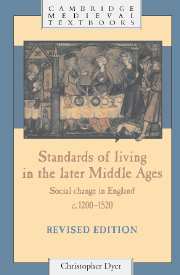Book contents
- Frontmatter
- Contents
- List of illustrations
- List of tables
- Preface
- Acknowledgements
- List of abbreviations
- Weights, measures and places
- Introduction
- 1 Late medieval society
- 2 Aristocratic incomes
- 3 The aristocracy as consumers
- 4 Aristocratic expenditure: making ends meet
- 5 Peasant living standards: modelling the peasant economy
- 6 Peasants as consumers
- 7 Urban standard of living
- 8 The wage-earners
- 9 Poverty and charity
- 10 The weather and standards of living
- Conclusion
- Medieval living standards – postscript
- Bibliography
- Index
- Cambridge Medieval Textbooks
Conclusion
Published online by Cambridge University Press: 05 June 2012
- Frontmatter
- Contents
- List of illustrations
- List of tables
- Preface
- Acknowledgements
- List of abbreviations
- Weights, measures and places
- Introduction
- 1 Late medieval society
- 2 Aristocratic incomes
- 3 The aristocracy as consumers
- 4 Aristocratic expenditure: making ends meet
- 5 Peasant living standards: modelling the peasant economy
- 6 Peasants as consumers
- 7 Urban standard of living
- 8 The wage-earners
- 9 Poverty and charity
- 10 The weather and standards of living
- Conclusion
- Medieval living standards – postscript
- Bibliography
- Index
- Cambridge Medieval Textbooks
Summary
‘Standards of living’, either today or in the past, cannot be measured exactly. In dealing with such a variable concept, we are not able to make precise or dogmatic judgements about the late medieval period. For example, any statistical series that can be compiled, as in the case of wage-rates, need to be assessed in the light of social circumstances, such as working practices, which are only partly understood. A further problem is raised by our need to calculate in terms of money, yet we know that much medieval exchange was conducted without direct payment in cash. Above all, in making comparisons between social groups, or in defining minimum requirements for life, we cannot be sure of our bench-marks for judging material well-being. We have seen that contemporaries believed that life could be sustained on ¼d. per day, which was the cost of a loaf of bread. Yet to maintain ‘physiological and sociopsychological health’ a variety of foods was required, and contributions toward the cost of clothing and housing, which would probably come near to the 1d. per head per day specified in some fifteenth-century schemes for poor relief. These sums mean very little when applied to the aristocracy, who often spent 2d. or 3d. per day on feeding each of their servants. Such figures imply that we should not expect to define a single scale of comparison, like a ladder on which different social groups occupied lower or higher rungs.
- Type
- Chapter
- Information
- Standards of Living in the Later Middle AgesSocial Change in England c.1200–1520, pp. 274 - 277Publisher: Cambridge University PressPrint publication year: 1989



